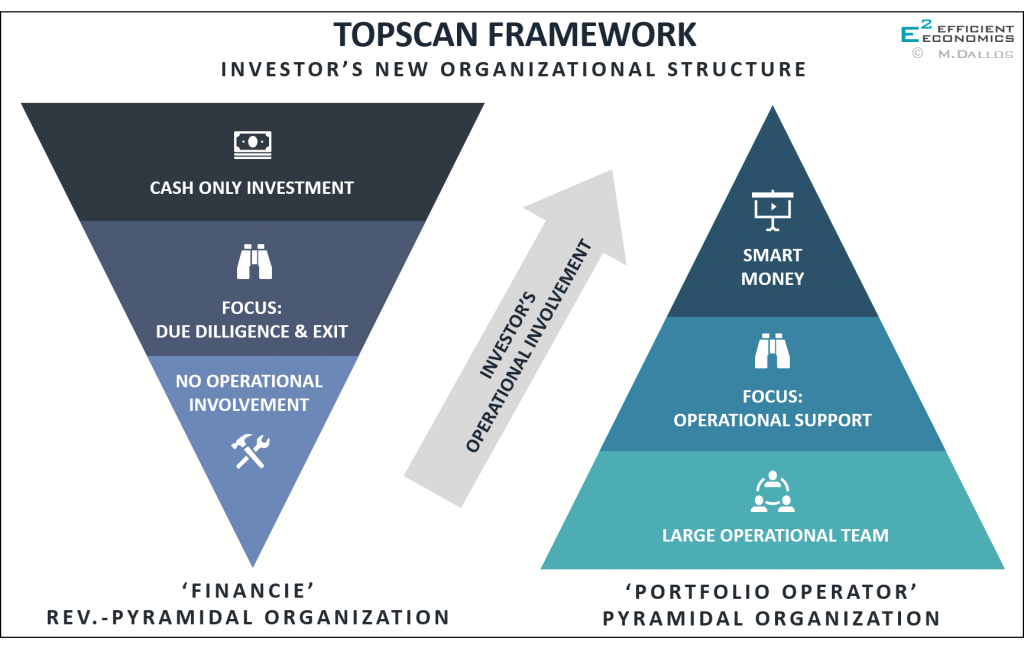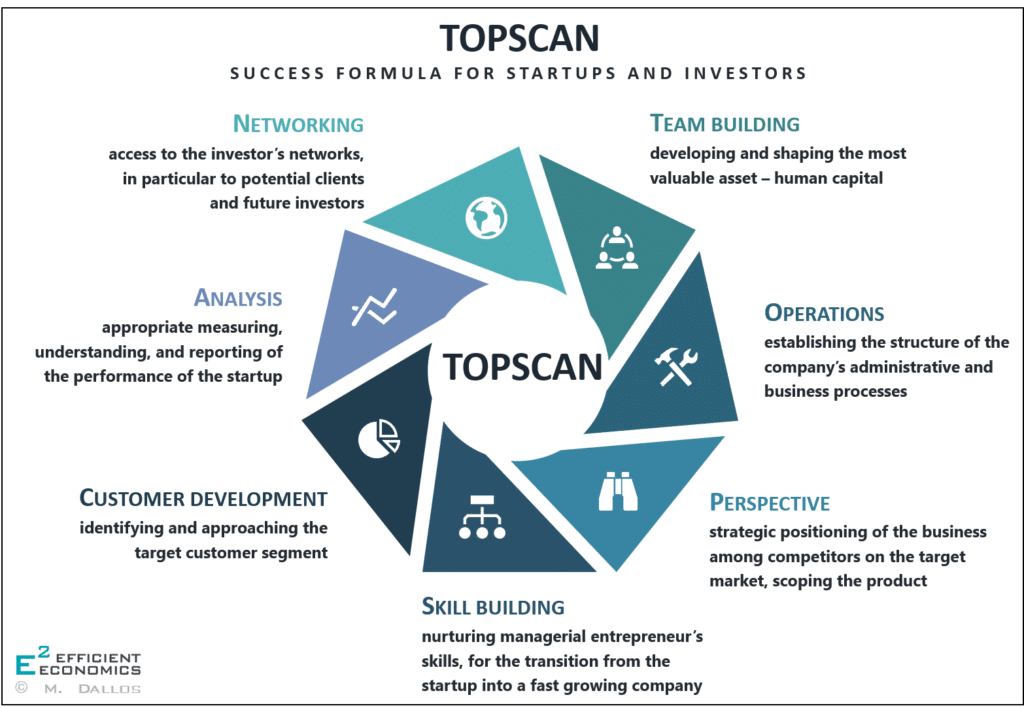Traditional venture capital investors provide mainly funds and are seldom involved in the operations of their portfolio companies. Many startups with funding and innovative products may still fail, since their founders are normally fascinated by technology and are focused on product development, while often neglecting marketing, sales, or company management.
Therefore, the investor’s strong operational involvement offers a formula of success to the new ventures. It also lowers the risk on the investor’s side by protecting the invested capital. The TOPSCAN framework provides a blueprint for operational involvement, hence may inspire the ‘Financiers-only’ investors to become successful Portfolio Operators. It was developed by Teten & Coll.[1] and is based on a survey of more than 50 venture capital companies.
What is TOPSCAN?
The TOPSCAN framework is based on the investor’s pro-active application of seven key management techniques in the portfolio companies:
- Team building: developing and shaping the most valuable asset – human capital
- Operations: establishing the structure of the company’s administrative and business processes, such as accounting or legal capacities
- Perspective: strategic positioning of the business among competitors on the target market, scoping the product
- Skill building: nurturing the relevant managerial skills of the startup entrepreneurs, required for the transition from the startup idea into a fast growing professional company
- Customer development: identifying and approaching the target customer segment
- Analysis: appropriate measuring, understanding, and reporting of the performance of the startup
- Network: access to the investor’s networks, in particular to potential clients and future investors
Due to the unique nature of the startup investment –investment into highly uncertain projects in a fast moving business environment, combined with the factor of technology-oriented fist-time entrepreneurs – startups strongly need the TOPSCAN methods, especially in their early stage. Hence a pro-active and institutionalized use of TOPSCAN framework may add tremendous value to the portfolio companies.
Which investor type are you? Which investor type you need?
Are you investing into early stage companies as a venture capitalist or business angel? Then you may face a decision: how strong do you want your operative involvement to be? On the other side of the aisle, if you are a startup seeking money, you should spend a moment thinking about the question: how ‘smart” should the money received from investors be?

According to a survey performed by Teten & Coll. [1], there are three basic types of venture capital investors based on their level of operative involvement:
1. Financier
is the ’banker’ among investors. This ‘silent’ investor believes that he could best function in providing capital, support for fund raising, and help with the exit. This behavior is similar to that of a loan-providing bank. He involves in start-ups only after a detailed due-diligence. The due-diligence is performed thoroughly, mainly in order to reduce the operational risks. The Financier reduces his daily operational involvement to monitoring the performance. He believes that mingling with the operational issues of the portfolio company will possibly do more harm than good.
Business Angels, many venture capital companies as well as state-supported VC-programs operate using this strategy. The consequence of their approach is that their organization is senior-level focused, leading to a reverse organizational pyramid: due to the sole focus on investment decision-making and control, there are more senior partners than junior investors.
2. Mentor
this ‘Consigliere’ investor believes that he can significantly strengthen his portfolio companies by providing an access to personal and professional networks. Networking has undoubtedly a positive effect by introducing the startup to many potential customers, suppliers, as well as promising employees. However, the Mentor type of investor has not institutionalized his support, which is provided predominantly reactively. The largest fraction of venture capital companies, operate as Mentors.
As an example, a 100-day program of a German-based corporate incubator provides up to 25 T€ in cash, office space, access to networks and mentors, as well as various workshops in exchange for 5% of the shares.
3. Portfolio Operator
in this case the operational support of the portfolio companies is highly structured and institutionalized. Substantial parts, or even the whole set of the TOPSCAN framework, are pro-actively used. In this way the investor not only provides his networks for recruiting or similar purposes, but actively develops and shapes the portfolio company from early stage start-up to a professional rising star. Hence, investment risk is reduced, since typical ‘start-up mistakes’, such as neglecting product sales, overconcentration on product development (at the cost of customer’s needs and interests), deficiencies in business processes, or one-sided team structure, are avoided.
Many successful companies are backed by portfolio operators. To name just a few: Airbnb, Facebook, Skype, Twitter, Instagram, supported by some of the largest US VC-companies, including ff Venture Capital, First Round Capital, and Andreessen Horowitz. One consequence of the operational focus is that these VC-companies have a substantial number of middle- and junior-level employees providing the required pro-active operational support. This leads to a pyramidal company structure in contrast to the reverse pyramid of the ‘financiers’.
Strategic investors could also provide smart money – additional benefits in the form of operational support. However, having a strategic investor onboard in an early stage may turn into a serious drawback. An exit to a different strategic investor, probably a competitor of the investor already onboard, will turn out to be difficult, if not impossible.
My recommendation: when searching for smart money, turn to a Portfolio Operator. Your venture will benefit strongly!
[1]D.Teten, A.AbdelFattah, K.Bremer, and G.Busling: The Journal of Private Equity, Vol. 16(2), 2013


